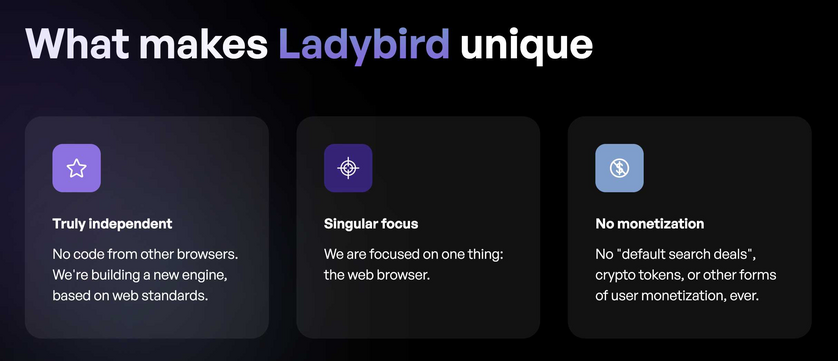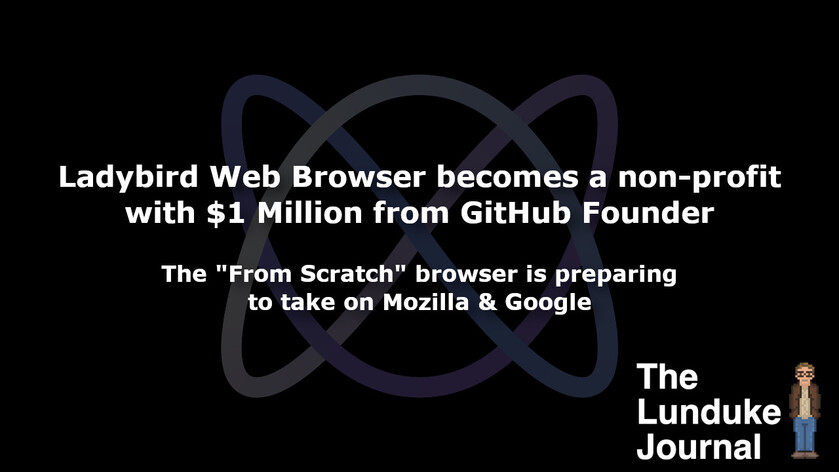The original founder of GitHub (Chris Wanstrath) has partnered up with the founder of SerenityOS and the Ladybird web browser (Andreas Kling) to create "The Ladybird Browser Initiative" -- a USA-based non-profit dedicated exclusively to building a brand new web browser. From scratch.
While many have claimed that developing a new web browser "from scratch" is an impossible goal, the founders of The Ladybird Browser Initiative believe they can do it. What's more, they are confident it can be done without taking any funding from corporate deals or advertising revenue.
Their goal? To have a fully functional "Alpha" version of the Ladybird browser ready sometime in 2026.
Ladybird Funding
Roughly one year ago, the Ladybird Browser received their first major sponsorship ($100,000 from Shopify). Now, with the creation of a 501(c)(3) non-profit (accompanied by a $1 Million dollar pledge from the GitHub founder), Ladybird is preparing to become the only major web browser which does not treat the user like the product being sold.
"Today, every major browser engine is open source, which is wonderful, but there's still one issue: they're all funded by Google's advertising empire. Chrome, Edge, Brave, Arc, and Opera all use Google's Chromium. Apple receives billions to make Google the default search engine in Safari, and Firefox has a similar deal where they receive hundreds of millions each year.
The world needs a browser that puts people first, contributes to open standards using a brand new engine, and is free from advertising's influence."
The fact that every major web browser engine is funded by advertising (specifically, via Google) is, indeed, a concern -- which makes the idea of a web browser free from that influence incredibly interesting.
But how, exactly, is Ladybird going to pull this off?
"Unlike traditional business models that rely on monetizing the user, Ladybird is funded entirely by sponsorships and donations from companies and individuals who care about the open web. Our non-profit will not pursue corporate deals or revenue outside of unrestricted donations. The software and its source code will be available for free, forever."
While it's easy to dismiss the notion of "funding a web browser via donations" as an unachievable, whimsical goal... Ladybird has already had some significant success in that area (not least of which, the $1 Million dollars from the GitHub founder), resulting in Ladybird already having 4 paid, full time developers (with 3 more programmers "starting soon").
So, maybe this approach is not as "unachievable" and "whimsical" as it first seems.
No Corporate Control
Also fascinating is this statement:
"Our non-profit will not pursue corporate deals or revenue outside of unrestricted donations."
What does that mean, in practice?
It means Ladybird won't be doing corporate deals for default search engines. Or marketing campaigns for other companies. This means that, if they can stick to their guns, Ladybird stands a real chance of a truly independent web browser... one which no company can control.
In fact the Ladybird Browser Initiative even has a policy specifically not allowing corporate donors to buy board seats:
"All sponsorships are in the form of unrestricted donations. Board seats and other forms of influence are not for sale."
This is a huge deal. Massive.
A problem many non-profit foundations face is corruption of their core mission via corporate control of their boards. There are many examples throughout the Open Source world of exactly this sort of problem (looking at you, Linux Foundation), and to see Ladybird recognize this problem -- and take action to prevent it -- right from the start?
Color me impressed.

The Current Status
The first public "Alpha" release of Ladybird may be a ways out (slated for 2026), but the current development versions are already quite far along.
"We can already do some of our daily browsing with Ladybird, like managing GitHub issues and pull requests, and commenting on Hacker News. The browser is improving every day, as our community of contributors are actively fixing bugs and adding features."
Testing of a recent build of Ladybird confirmed that statement. Many websites function perfectly -- including some quite complex sites. While many other websites were... less than functional. Lots of work has clearly been done, with lots more left to do.
Can the development team improve Ladybird to a point where it will be usable, as a primary web browser, some time in next few years? Considering the progress to date... it seems entirely possible.
"We won't be chasing buzzwords"
The Lunduke Journal reached out to The Ladybird Browser Initiative's co-Founder, Andreas Kling, with a burning question...
Now that the Ladybird web browser has an official nonprofit, with multiple full time developers working on it, you are clearly moving towards direct competition with the likes of Google and Mozilla. The eye of Sauron is upon you. How does that feel?
Kling's response:
"Feels great! The web is one of humanity's greatest inventions, and it deserves diverse, competing implementations to truly thrive. The industry has been heading in a troubling direction for years, with companies like Microsoft and Opera abandoning their own browser engines in favor of Chromium.
We obviously don't have the resources of companies like Google, Apple, and Mozilla, so things will take some time. However, I'm extremely optimistic about the road ahead. We have a fantastic community of developers working on Ladybird, and we're making solid, consistent progress.
One thing we have going for us is focus. Unlike the major players, we're *completely* focused on one thing only: the web browser.
We won't be chasing buzzwords or looking for alternative revenue streams. Our goal is to build a good browser and give it away for free, while soliciting nothing but unrestricted donations from anyone who likes what we're doing."
There's a lot here to be excited about.
- No chasing buzzwords.
- No alternative revenue streams.
- Total focus on the web browser.
- A brand new, from scratch browser engine.
- No advertising or Big Tech influence.
- A rag-tag team of rebels going, toe to toe, with the Big Tech web browser makers.
While, according to the Ladybird team, they are a ways off from a major public release... it's hard not to feel a bit optimistic about what this could mean for the future of web browsing. This may be early days still, but the possibilities are tantalizing.
The Lunduke Journal is rooting for you, Ladybird.


















